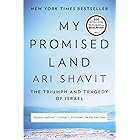| Kindle Price: | $14.99 |
| Sold by: | Random House LLC Price set by seller. |
Your Memberships & Subscriptions

Download the free Kindle app and start reading Kindle books instantly on your smartphone, tablet, or computer - no Kindle device required.
Read instantly on your browser with Kindle for Web.
Using your mobile phone camera - scan the code below and download the Kindle app.

OK
If a Place Can Make You Cry: Dispatches from an Anxious State Kindle Edition
“An outstanding work . . . powerfully and movingly written.”—Jerusalem Post
WINNER OF THE “BOOKS FOR A BETTER LIFE” AWARD
In the summer of 1998, Daniel Gordis and his family moved to Israel from Los Angeles. They planned to be there for a year, but a few months into their stay, Daniel and his wife decided to remain in Jerusalem permanently, confident that their children would be among the first generation of Israelis to grow up in peace.
Immediately after arriving in Israel, Daniel had started sending out e-mails about his life to friends and family abroad. These missives—passionate, thoughtful, beautifully written, and informative—began reaching a much broader readership than he’d ever envisioned, eventually being excerpted in The New York Times Magazine to much acclaim.
An edited and finely crafted collection of Daniel’s original e-mails, If a Place Can Make You Cry is a first-person, immediate account of Israel’s post-Oslo meltdown that cuts through the rhetoric and stridency of most dispatches from that country or from the international media. Above all, If a Place Can Make You Cry tells the story of a family that must cope with the sudden realization that they took their children from a serene and secure neighborhood in Los Angeles to an Israel not at peace but mired in war.
This is the chronicle of a loss of innocence—the innocence of Daniel and his wife, and of their children. Ultimately, through Daniel’s eyes, Israel, with all its beauty, madness, violence, and history, comes to life in a way we’ve never quite seen before.
- LanguageEnglish
- PublisherCrown
- Publication dateOctober 15, 2002
- File size598 KB
Customers who bought this item also bought
Editorial Reviews
From Publishers Weekly
Copyright 2002 Reed Business Information, Inc.
From Booklist
Copyright © American Library Association. All rights reserved
From the Inside Flap
Immediately after arriving in Israel, Daniel had started sending out e-mails about his and his family’s life to friends and family abroad. These missives―passionate, thoughtful, beautifully written, and informative―began reaching a much broader readership than he’d ever envisioned, eventually being excerpted in The New York Times Magazine to much acclaim. An edited and finely crafted collection of his original e-mails, If a Place Can Make You Cry is a first-person, immediate account of Israel’s post-Oslo meltdown that
cuts through the rhetoric and stridency of most dispatches from that country or from the international media.
Above all, Gordis tells the story of a family that must cope with the sudden realization that they took their children from a serene and secure neighborhood in Los Angeles to an Israel not at peace but mired in war. This is the chronicle of a loss of innocence―the innocence of Daniel and his wife, and of their children. Ultimately, through Gordis’s eyes, Israel, with all its beauty, madness, violence, and history, comes to life in a way we’ve never quite seen before.
Daniel Gordis captures as no one has the years leading up to what every Israeli dreaded: on April 1, 2002, Prime Minister Ariel Sharon declared that Israel was at war. After an almost endless cycle of suicide bombings and harsh retaliation, any remaining chance for peace had seemingly died.
If a Place Can Make You Cry is the story of a time in which peace gave way to war, when childhood innocence evaporated in the heat of hatred, when it became difficult even to hope. Like countless other Israeli parents, Gordis and his wife struggled to make their children’s lives manageable and meaningful, despite it all. This is a book about what their children gained, what they lost, and how, in the midst of everything, a whole family learned time and again what really matters.
About the Author
Product details
- ASIN : B000QCSA1S
- Publisher : Crown (October 15, 2002)
- Publication date : October 15, 2002
- Language : English
- File size : 598 KB
- Text-to-Speech : Enabled
- Screen Reader : Supported
- Enhanced typesetting : Enabled
- X-Ray : Not Enabled
- Word Wise : Enabled
- Sticky notes : On Kindle Scribe
- Print length : 227 pages
- Best Sellers Rank: #2,051,764 in Kindle Store (See Top 100 in Kindle Store)
- #1,427 in History of Israel & Palestine
- #2,054 in Historical Middle East Biographies
- #5,047 in Biographies & Memoirs of Authors
- Customer Reviews:
About the author

Dr. Daniel Gordis is Senior Vice President and the Koret Distinguished Fellow at Shalem College. The author of more than ten books, Gordis is a regular columnist for both the Jerusalem Post and for Bloomberg View.
Gordis’ writing has appeared in magazines and newspapers including the New York Times, The New Republic, the New York Times Magazine, Azure, Commentary and Foreign Affairs, and his books have received numerous awards. He won the National Jewish Book Award for Saving Israel, and two of his books were Finalists for the National Jewish Book Award.
Gordis’ newest book is a history of the State of Israel entitled ISRAEL: A CONCISE HISTORY OF A NATION REBORN. Ambassador Dennis Ross, reflecting on the book, wrote, “When I am asked ‘Is there one book to read about Israel?’ I now have an answer.” Ari Shavit wrote, “Like Israel itself, Daniel Gordis’s Israel: A Concise History of a Nation Reborn is audacious, intensive and unique.” Yossi Klein HaLevi wrote, “Daniel Gordis has written a luminous history …. Gordis gives us the soul of Israel, and helps explain why the most hated country on the planet is also among the most beloved.”
Professor Alan Dershowitz has called Gordis “one of Israel’s most thoughtful observers.” The Forward has called him “one of the most respected Israel analysts around.” In 2014, the Jerusalem Post listed him as one of the world’s 50 most influential Jews, while Jeffrey Goldberg of the Atlantic has written, “If you asked me, ‘of all the people you know, who cares the most about the physical, moral and spiritual health of Israel?’ I would put the commentator and scholar Daniel Gordis at the top of the list.”
Customer reviews
Customer Reviews, including Product Star Ratings help customers to learn more about the product and decide whether it is the right product for them.
To calculate the overall star rating and percentage breakdown by star, we don’t use a simple average. Instead, our system considers things like how recent a review is and if the reviewer bought the item on Amazon. It also analyzed reviews to verify trustworthiness.
Learn more how customers reviews work on Amazon-
Top reviews
Top reviews from the United States
There was a problem filtering reviews right now. Please try again later.
Will the family stay? Should they stay? They must, as they note, "It is our home." Recommended.
When Rabbi Gordis was offered a year-long fellowship in Jerusalem, the Oslo peace process was offering a vision of peace and prosperity for a country that had seen neither for some time. Inspired by what they saw, the Gordis family cancelled their plans to return to Los Angeles and moved permanently to Israel; a move known to Jews as "making aliyah," or in English, "rising up." Daniel Gordis began to write occasional email essays to family & friends updating them on this new life, and the emails were forwarded to a wide circle. Eventually they were extracted in the New York Times, and now they've been collected (with some new writings as connective tissue) in this remarkable book.
What shines through this book is the gradual dimming of the idealism with which the Gordis family saw their new country. As the peace process collapsed, replaced by a constant undercurrent of shootings, bombings and rocket attacks, Israeli attitudes and opinions moved firmly towards an uncompromising crackdown on Arab terrorism. Former liberals and peace activists found themselves grasping for a framework that could support their principles; but this time partners were hard to find.
The most disturbing part of the book is hearing the effect that it has had on the Gordis children. They went to a country that offered them safety and security, a place where they could walk safely in the streets late at night, but ended up living in a war zone. A comment by his son, quoted on the back cover, illustrates the heartbreaking transition the family has made:
"You know what I think?," he suddenly added. "I think that when grown-ups really love Israel, they're even ready for their children to get killed for it. That's what I think."
Despite the hardship of life in Israel now, the overall tone of the book is positive. The Gordis parents continue the struggle to make life for their children meaningful and nurturing, secure in the belief that the choices they've made for their lives are the correct ones, despite the challenges.
But why did I read it? It was because I'd seen an article by Gordis called "Take Off That Mask." The article was in the form of a letter, sent at Purim to Jill Jacobs, a graduating rabbinical student. The letter began, "Dear Jill," and I simply had to read it. Jill was quite properly concerned about human rights in Israel, not just for Jews but for everyone. But when she wrote about it, she came up with something quite controversial that eventually got a reply from Gordis. He pointed out that Jill was showing an unjustified certainty that Israel was simply Wrong, and that she was claiming that Israel had better options that were manifest to any moral person. And that her writing showed a dangerous and myopic irresponsibility, as well as a lack of love for Israel. Well, after reading all that, I simply had to read "If a Place Can Make You Cry."
The more I thought about this interesting and thoughtfully written book, the more I realized that it deserved a jilllike response. Maybe something like, um:
Dear Daniel,
I'm a Pagan. I really enjoyed your book. I don't judge Israel. I don't think it is Wrong. And I don't know what it ought to do. Still, even though I know that many centuries ago, the Jews in that region killed Jezebel, I truly support Israel. And I hope that it will thrive in peace and that vast numbers of Israeli Jews will be walking out of Yom Kippur services during Yizkor.
I've thought about why Israel is rightfully Yours and not Mine. And here is my answer. There are millions of You. And just one of Me. And You wanted Israel and You outbid others and bought the land and made it bloom. That is why it is rightfully Yours.
Shabbat Shalom,
Jill











